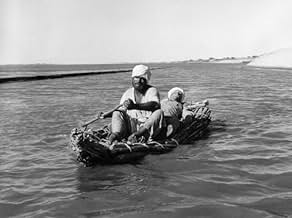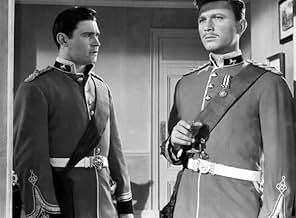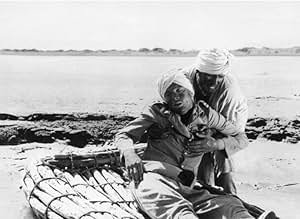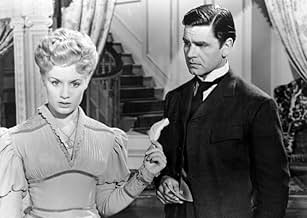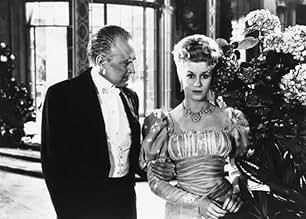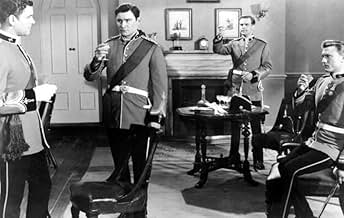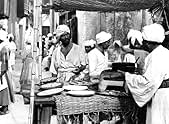VALUTAZIONE IMDb
6,1/10
707
LA TUA VALUTAZIONE
Aggiungi una trama nella tua linguaA British officer resigns his commission on the eve of his regiment's departure for war in Sudan. Accused of cowardice by his friends and the woman he loves, he sets out to prove his courage... Leggi tuttoA British officer resigns his commission on the eve of his regiment's departure for war in Sudan. Accused of cowardice by his friends and the woman he loves, he sets out to prove his courage to them. A remake of "The Four Feathers" (1939).A British officer resigns his commission on the eve of his regiment's departure for war in Sudan. Accused of cowardice by his friends and the woman he loves, he sets out to prove his courage to them. A remake of "The Four Feathers" (1939).
- Regia
- Sceneggiatura
- Star
Recensioni in evidenza
A tepid remake of their spectacular 1939 version, one wonders what the Korda's where thinking. Indeed much of the location footage is recycled directly from the 1939 film including the whole final battle, aside from some closeups of the 1955 actors. Mildly entertaining, but the 1939 version is better, much much better.
If you're going to clone something in Hollywood, clone something good which is what Storm Over The Nile is. It is yet another remake of the famous novel The Four Feathers. The same treatment was afforded Dawn Patrol by Warner Brothers back in the Thirties when the first version with Douglas Fairbanks, Jr. was cloned into the second with Errol Flynn.
The script from the classic British production from 1939 was used as well as all the battle sequences. That was a wise thing because in 1939 the British controlled the Sudan and were able to film their action sequences on the very spot where these things occurred back in the late 19th century. Not to mention that it certainly saved big time on the budget.
Anthony Steel plays our protagonist Harry Fevasham who questions his own courage when he's about to be shipped into action in the Sudan. Steel is from a military family and there are reasons of tradition and obligations that force him into that life. His brother officers brand him a coward and send him a white feather as the symbol of same.
Some time later Steel goes to the Sudan and lives as an Arab tribesman and in that role performs some truly heroic feats. Best as always is his saving Laurence Harvey who is one of his accusers who is now blind as a result of prolonged exposure to the desert sun. Harvey's role was done in 1939 by Ralph Richardson.
James Robertson Justice is also in the cast playing a really good John Bull type character. He's the father of Mary Ure who was supposed to marry Steel before his resignation and the feathers. JRJ always adds a lot to any film he's ever in.
The Four Feathers with its story about a man questioning his courage and finding out truly if he has the right stuff is in the British culture very much akin to The Red Badge Of Courage. That has only had one film adaption whereas The Four Feathers has had many. Beau Bridges did one in the Seventies and the late Heath Ledger starred as Harry Fevasham in the latest screen version.
But only the 1939 and 1955 can boast actual on scene location shooting. And unless the Sudan changes radically were not likely to see another.
The script from the classic British production from 1939 was used as well as all the battle sequences. That was a wise thing because in 1939 the British controlled the Sudan and were able to film their action sequences on the very spot where these things occurred back in the late 19th century. Not to mention that it certainly saved big time on the budget.
Anthony Steel plays our protagonist Harry Fevasham who questions his own courage when he's about to be shipped into action in the Sudan. Steel is from a military family and there are reasons of tradition and obligations that force him into that life. His brother officers brand him a coward and send him a white feather as the symbol of same.
Some time later Steel goes to the Sudan and lives as an Arab tribesman and in that role performs some truly heroic feats. Best as always is his saving Laurence Harvey who is one of his accusers who is now blind as a result of prolonged exposure to the desert sun. Harvey's role was done in 1939 by Ralph Richardson.
James Robertson Justice is also in the cast playing a really good John Bull type character. He's the father of Mary Ure who was supposed to marry Steel before his resignation and the feathers. JRJ always adds a lot to any film he's ever in.
The Four Feathers with its story about a man questioning his courage and finding out truly if he has the right stuff is in the British culture very much akin to The Red Badge Of Courage. That has only had one film adaption whereas The Four Feathers has had many. Beau Bridges did one in the Seventies and the late Heath Ledger starred as Harry Fevasham in the latest screen version.
But only the 1939 and 1955 can boast actual on scene location shooting. And unless the Sudan changes radically were not likely to see another.
I had the advantage of watching Zoltan Korda's 1939 'The Four Feathers' on one afternoon and this his 'Storm over the Nile' on the next and since there have been at least 5 versions filmed cannot understand why it was not issued as 'The Four Feathers' or more appropriately 'The Two Feathers' as those given to Lieutenants Thomas Willoughby and Peter Burroughs were largely irrelevant to the plot although getting Harry Faversham flogged in the original and just incarcerated in the second ? One could believe John Clements considered himself a Coward but not Anthony Steele. I would cross the street and a few deserts for Mary Ure but not June Duprez- she deserved the far from noble Ralph Richardson but not Laurence Harvey who started off the sequel. Laurence Harvey started off with a reddish brown rat on his forehead which might well have saved him from Retinal damage when his lost his Hat. Indeed it is hard to select a single Actor or Actress who was better in the original and usually considered superior version but that is after we have watched both. As a stand alone Storm over the Nile is both more watchable and allowed Zoltan Korda to clean up several nonsenses from his original. Such as how and why John Durrance became sun blind. Ralph Richardson leading his troops keeping that he was blind a secret. The hovering vultures and other reasons why LH tries more convincingly to shoot himself. How Harry Faversham passed over the so important File and the Mahdi's guards searching them for it. All in all certainly not deserving the criticism - who shouldn't any Director use the same footage twice or shoot an overlong schedule and then divide it into two ? Nobody has to pay to watch any Film or spend the time glued to the telly.
Being something of a pacifist, Harry Faversham (Anthony Steele) has the misfortune to be born into a staunchly military family with all the expectations of an overbearing father (Michael Hordern) weighing down on his shoulders. Harry toes the line to please his dad, but when the old boy pops his clogs, he swiftly resigns his commission. As a consequence, he receives a white feather (the symbol of cowardice) from each of his best friends (Laurence Harvey, Ronald Lewis, and an out-of-place Ian Carmichael) on the eve of their departure to war in the Sudan. Harry awards himself a symbolic feather on behalf of his fiancée (Mary Ure) whose disappointment is clear. Harry determines to make his former friends take back their feathers, which is the signal for much derring-do to begin (hurrah!).
The tale of the four feathers is the epitome of the schoolboy adventure yarn with heroic soldiers blinded in battle, heroic soldiers captured by the fuzzie-wuzzies (not nice, I can tell you!), heroic cowards braving forehead-branding and boot polish to go deep under cover in darkest Africa, and pompous old boors endlessly recounting their role in the battle of Balaclava back in the Crimean. It should really be boredom-proof, but the sad truth is that this version comes perilously close to inducing that state at times. The film is practically a word-for-word remake of the 1939 version – and even makes scandalously wholesale use of the earlier version's battle scenes – which means it probably came across as a bit staid back in 1955, but looks positively creaky today.
Anthony Steel isn't a particularly convincing hero: at thirty-five he's playing a twenty-five year old who somehow looks forty-five, but the problem is more in the lack of sympathy Steel creates for his character. His Harry Faversham is the sort that sits in the corner and speaks when he's spoken too, and is therefore a little too bland to be a dashing hero, despite his acts of heroism. And exactly what sort of reaction did he expect to receive when he resigned his commission? Doesn't trotting off to the desert to regain his honour in the eyes of his friends and fiancée simply negate the strength of character required to resign in the first place? A young Laurence Harvey fares better as Faversham's upper-crust chum who suffers sun blindness when hiding from the fuzzies, and would arguably have been better suited to the leading man role. Ronald Lewis has practically nothing to do, while Ian Carmichael, on the cusp of his comedy career, comes off as a plummy-voiced twit.
The film isn't awful by any standards, but it really could have benefited from fifteen minutes being pruned from its running time, and a little more fire in young Faversham's belly.
The tale of the four feathers is the epitome of the schoolboy adventure yarn with heroic soldiers blinded in battle, heroic soldiers captured by the fuzzie-wuzzies (not nice, I can tell you!), heroic cowards braving forehead-branding and boot polish to go deep under cover in darkest Africa, and pompous old boors endlessly recounting their role in the battle of Balaclava back in the Crimean. It should really be boredom-proof, but the sad truth is that this version comes perilously close to inducing that state at times. The film is practically a word-for-word remake of the 1939 version – and even makes scandalously wholesale use of the earlier version's battle scenes – which means it probably came across as a bit staid back in 1955, but looks positively creaky today.
Anthony Steel isn't a particularly convincing hero: at thirty-five he's playing a twenty-five year old who somehow looks forty-five, but the problem is more in the lack of sympathy Steel creates for his character. His Harry Faversham is the sort that sits in the corner and speaks when he's spoken too, and is therefore a little too bland to be a dashing hero, despite his acts of heroism. And exactly what sort of reaction did he expect to receive when he resigned his commission? Doesn't trotting off to the desert to regain his honour in the eyes of his friends and fiancée simply negate the strength of character required to resign in the first place? A young Laurence Harvey fares better as Faversham's upper-crust chum who suffers sun blindness when hiding from the fuzzies, and would arguably have been better suited to the leading man role. Ronald Lewis has practically nothing to do, while Ian Carmichael, on the cusp of his comedy career, comes off as a plummy-voiced twit.
The film isn't awful by any standards, but it really could have benefited from fifteen minutes being pruned from its running time, and a little more fire in young Faversham's belly.
Sweeping new adaptation plenty of idealism ,heroism , friendship , redemption and overwhelming battles. It's a great classical movie of the British imperialism adventure , a genuine ripping yarn picking up several stunning images and with some stirring action taken from the quite better 1939 version . This fifth rendition about known story by A. E. W. Mason concerns a British young officer named Harry Faversham (Anthony Steel). Resigning from Army , he's rejected by his father-in-law (James Robertson Justice) and his engaged fiancée (Mary Ure), branded a coward and sent four white feathers by his friends (Ronald Lewis, Laurence Harvey, Ian Carmichael) . Determined to save his honor he heads to Sudan campaign against Derviches who previously (thirteen years before) had murdered General Gordon in Karthoum. There arrives the expedition of help commanded by General Wolsey and Kitchener for stifle the rebellious Sudan's tribes ruled by 'the Madhdi' , the ¨expected one¨ (events developed in ¨Khartoum¨ film -1966- with Charlton Heston and Laurence Olivier , directed by Basil Dearden) . The Madhi along with Arab tribes had besieged Khartoum (1884) and vanquished General Gordon . Faversham disguised himself as a native will save his friends from certain death and he will retrieve the lost honors .
This is a spectacular adventure detailing the epic feats of a brave hero, containing noisy action, idealism , romance , unlimited courage , breathtaking battles and impressive landscapes . It's a typically polished British and packs real enthusiasm of the imperialist arrogance along with standard heroic issues . Anthony Steel as stubborn officer is fine , Laurence Harvey as his best friend is convincingly played and Mary Ure as his girlfriend is enjoyable . Special mention for James Roberson Justice as swagger general Burroughs . Solid performances all around and excellent plethora of secondaries as Christopher Lee , Ferdy Mayne , Michael Hordern , Geoffrey Keen , among them . Sensational battle scenes staged by means of thousands of extras , though partially taken from former film directed by Zoltan Korda . Evocative cinematography in superb Technicolor camera-work , showing the late 1800's and sunny African landscapes by two cameramen : Edward Scaife and Osmond Borradaille for exterior photography in Sudan and interior filmed in Shepperton studios . Rousing and impressive musical score by Benjamin Frankel . The motion picture was professionally directed by Zoltan Korda and Terence Young with imagination and fair-play enough .
Other adaptations about this famous story are the following ones : the old and silent renditions filmed in 1915 , 1921 , and 1929 directed by Ernest B. Schoedsack and Merian C. Cooper with Richard Arlen, Fay Wray and Clive Brook ; the classic rendition by Zoltan Korda (1939) with John Clemens , Ralph Richardson and Jane Duprez ; and for TV (1978) by Don Sharp with Beau Bridges , Jane Seymour , Robert Powell and eventually , a modern rendition with Heath Ledger , Kate Hudson , Wes Bentley , and Michael Sheen .
This is a spectacular adventure detailing the epic feats of a brave hero, containing noisy action, idealism , romance , unlimited courage , breathtaking battles and impressive landscapes . It's a typically polished British and packs real enthusiasm of the imperialist arrogance along with standard heroic issues . Anthony Steel as stubborn officer is fine , Laurence Harvey as his best friend is convincingly played and Mary Ure as his girlfriend is enjoyable . Special mention for James Roberson Justice as swagger general Burroughs . Solid performances all around and excellent plethora of secondaries as Christopher Lee , Ferdy Mayne , Michael Hordern , Geoffrey Keen , among them . Sensational battle scenes staged by means of thousands of extras , though partially taken from former film directed by Zoltan Korda . Evocative cinematography in superb Technicolor camera-work , showing the late 1800's and sunny African landscapes by two cameramen : Edward Scaife and Osmond Borradaille for exterior photography in Sudan and interior filmed in Shepperton studios . Rousing and impressive musical score by Benjamin Frankel . The motion picture was professionally directed by Zoltan Korda and Terence Young with imagination and fair-play enough .
Other adaptations about this famous story are the following ones : the old and silent renditions filmed in 1915 , 1921 , and 1929 directed by Ernest B. Schoedsack and Merian C. Cooper with Richard Arlen, Fay Wray and Clive Brook ; the classic rendition by Zoltan Korda (1939) with John Clemens , Ralph Richardson and Jane Duprez ; and for TV (1978) by Don Sharp with Beau Bridges , Jane Seymour , Robert Powell and eventually , a modern rendition with Heath Ledger , Kate Hudson , Wes Bentley , and Michael Sheen .
Lo sapevi?
- QuizRe-used a great deal of stock footage from Le quattro piume (1939), including the entire final battle sequence.
- BlooperHooded vultures are shown making many and various calls. The species, in common with other Old World vultures, is largely silent.
- Curiosità sui creditiOpening credits prologue: In 1885 the rebellious army of dervishes enslaved and killed many thousands of defenceless natives in the Sudan. Then laid siege to Khartoum. The scanty garrison's heroic commander, General Gordon appealed for help from England - but no help reached him.
- ConnessioniEdited from Le quattro piume (1939)
I più visti
Accedi per valutare e creare un elenco di titoli salvati per ottenere consigli personalizzati
- How long is Storm Over the Nile?Powered by Alexa
Dettagli
- Data di uscita
- Paese di origine
- Lingua
- Celebre anche come
- Zoltan Korda's Production Storm Over the Nile
- Luoghi delle riprese
- Aziende produttrici
- Vedi altri crediti dell’azienda su IMDbPro
- Tempo di esecuzione1 ora 47 minuti
- Proporzioni
- 2.55 : 1
Contribuisci a questa pagina
Suggerisci una modifica o aggiungi i contenuti mancanti

Divario superiore
By what name was Tempesta sul Nilo (1955) officially released in India in English?
Rispondi
